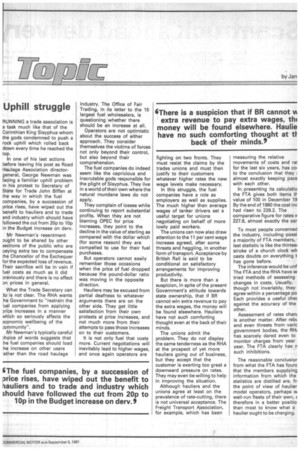Uphill struggle
Page 35

If you've noticed an error in this article please click here to report it so we can fix it.
RUNNING a trade association is a task much like that of the Corinthian King Sisyphus whom the gods condemned to push a rock uphill which rolled back down every time he reached the top.
In one of his last actions before leaving his post as Road Haulage Association directorgeneral, George Newman was facing a familiar uphill problem in his protest to Secretary of State for Trade John Biffen at the way in which the fuel companies, by a succession of price rises, have wiped out the benefit to hauliers and to trade and industry which should have followed the cut from 20p to 10p in the Budget increase on derv.
Mr Newman's resentment ought to be shared by other sections of the public who are paying extra tax to compensate the Chancellor of the Exchequer for the expected loss of revenue. Their sacrifice will be in vain if fuel costs as much as it did previously and there is no effect Dn prices in general.
What the Trade Secretary can Jo is not clear. The RHA wants he Government to "restrain the iuel companies from applying price increases in a manner tvhich so seriously affects the 3conomic wellbeing of the ;ommunity".
Mr Newman's typically careful ;hoice of words suggests that he fuel companies should load he increase on other users • ather than the road haulage industry. The Office of Fair Trading, in its letter to the 15 largest fuel wholesalers, is questioning whether there should be an increase at all.
Operators are not optimistic about the success of either approach. They consider themselves the victims of forces not only beyond their control, but also beyond their comprehension.
The fuel companies do indeed seem like the capricious and inscrutable gods responsible for the plight of Sisyphus. They live in a world of their own where the natural mundane laws do not apply.
They complain of losses while continuing to report substantial profits. When they are not blaming OPEC for price increases, they point to the decline in the value of sterling as compared with the dollar which (for some reason) they are compelled to use for their fuel Purchases.
But operators cannot easily remember those occasions when the price of fuel dropped because the pound-dollar ratio was moving in the opposite direction.
Hauliers may be excused from partial deafness to whatever arguments there are on the other side. They get little satisfaction from their own protests at price increases, and not much more from their attempts to pass those increases on to their customers.
It is not only fuel that costs more. Current negotiations will inevitably lead to higher wages, and once again operators are fighting on two fronts. They must resist the claims by the trades unions and must then justify to their customers whatever higher rates the new wage levels make necessary.
In this struggle, the fuel companies have a role as employers as well as supplies. The much higher than average wages of tanker drivers set a useful target for unions negotiating on behalf of more lowly paid workers.
The unions can now also draw attention to the 11 per cent wage increase agreed, after some threats and haggling, in another form of transport. Acceptance by British Rail is said to be conditional on satisfactory arrangements for improving productivity.
But there is more than a suspicion, in spite of the present Government's attitude towards state ownership, that if BR cannot win extra revenue to pay the extra wages, the money will be found elsewhere. Hauliers have not such comforting thought even at the back of their minds.
The unions admit the problem. They do not display the same tenderness as the RHA at the prospect of yet more hauliers going out of business, but they accept that the customer is exerting too great a downward pressure on rates. They may even be willing to help in improving the situation.
Although hauliers and the unions agree at least on the prevalence of rate-cutting, there is not universal acceptance. The Freight Transport Association, for example, which has been measuring the relative movements of costs and ral for the last six years, has col to the conclusion that they almost exactly keeping pace with each other.
In presenting its calculatio the FTA gives both items th value of 100 in December 19 By the end of 1980 the cost inc had risen to 228.2. The comparative figure for rates v 227.8, almost exactly the sar To most people concerned the industry, including possi a majority of FTA members, • last statistic is like the thirteei stroke of a church clock wh casts doubts on everything t has gone before.
The inference would be unf The FTA and the RHA have w tried methods of assessing changes in costs. Usually, though not invariably, they agree within a percentage po Each provides a useful chec against the accuracy of the other.
Assessment of rates chani is another matter. After rela and even threats from varic government bodies, the RH, has scarcely dared even to monitor charges from year year. The FTA clearly has n such inhibitions.
The reasonable conclusior from what the FTA has fount that the members supplying information from which the statistics are distilled are, fri the point of view of haulier model operators, perhaps w well-run fleets of their own, z therefore in a better positio than most to know what a haulier ought to be charging.








































